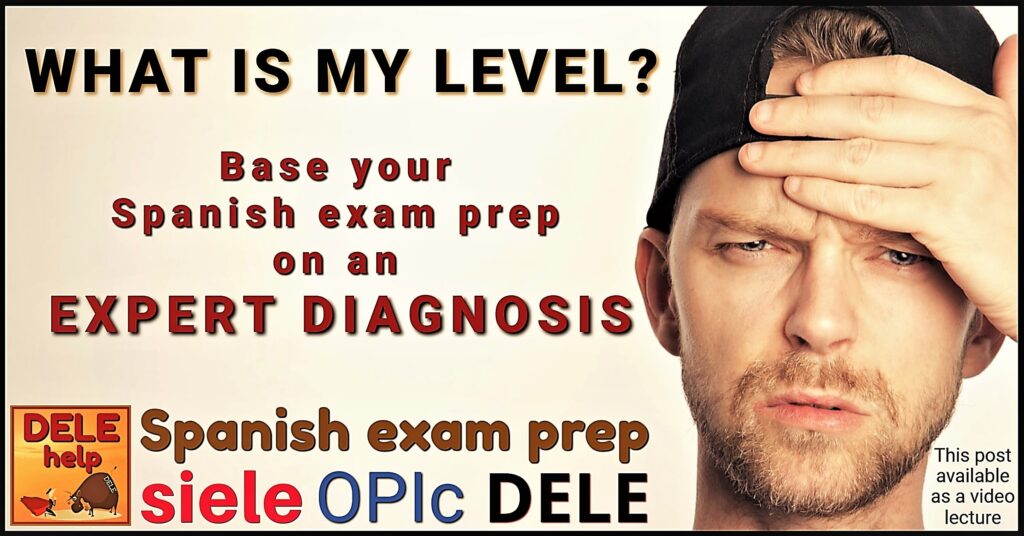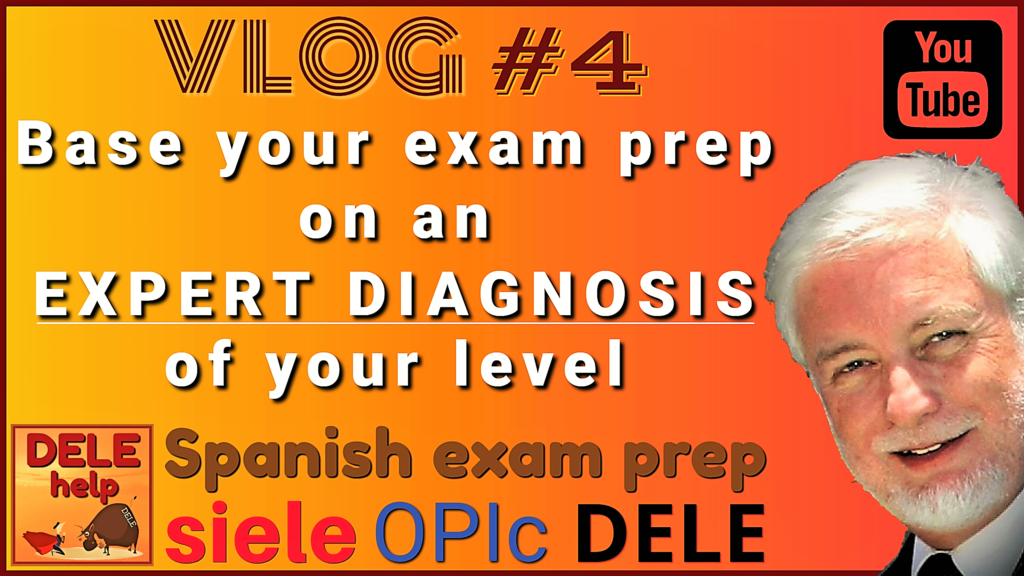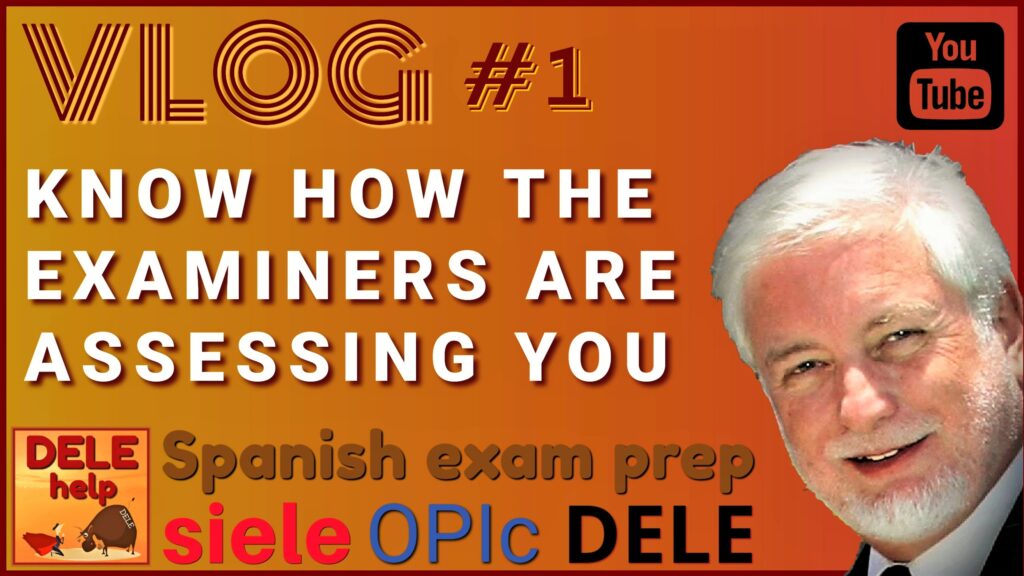BASE YOUR SPANISH EXAM PREP ON AN EXPERT DIAGNOSIS OF YOUR LEVEL

Proper prepping for your Spanish exam requires a study plan. This plan, like a road map, needs to plot how you are going to get from where you are, to where you need to be. Because, just as with planning any journey, you need to have clarity about both your departure point and your destination, to be able to map out the best route.
To clarify for yourself the “destination” part of this challenge, you need to be familiar with your exam’s curriculum and the scoring criteria the examiners will apply – in other words, the “destination” is defined by what the examiners will be expecting from you. But equally as important as knowing your destination, is the need to determine your true departure point – what your strengths and (especially) your weaknesses are; the latter which you need to address in your exam prep. You, therefore, need to base your Spanish exam prep on an expert diagnosis of your level, from the very outset. This blog post will explain the why and how of having such an expert assessment done.
Please note: if you would prefer to enjoy this blog post as a video lecture – rather than having to read it – then simply CLICK ON THE IMAGE BELOW and you will be taken to our VLOG #4, presenting the same content in even more detail on YouTube: https://youtu.be/jpAiQtEqf5Q

WHERE TO GET INFORMATION ABOUT YOUR EXAM’S SCORING CRITERIA AND CURRICULUM:
To revert for a moment to the definition of your destination, i.e., your study goal: we’ve recently done a detailed Blog Post on this key topic: https://delehelp.org/understand-how-your-spanish-exam-is-scored-opi-dele-siele/ as well as a parallel free video lecture (which you can access as VLOG #1 on our DELEhelp YouTube channel, by clicking on this link: https://youtu.be/aELQ6XFeJic ).

HOW TO DRAW UP YOUR STUDY PLAN:
By knowing your departure point as well as your intended destination, you will be able to draw up a realistic, goal-focused study plan with which to guide your exam prep. To learn how to craft such a personalized study plan of your own, please look at this DELEhelp blog post: https://delehelp.org/focus-your-dele-siele-opi-exam-preparation/

WHY YOU NEED TO BASE YOUR EXAM PREP ON AN EXPERT DIAGNOSIS OF YOUR LEVEL:
NOW, back to this present post (or video lecture, if you prefer): we will now be looking at why, and then how an expert diagnosis of your level needs to be done at the very outset (that is, if you want a sound, validated basis for properly focusing your exam prep, thereby enabling you to deliver to the examiners what they are actually looking for).
It is true that there is any number of so-called “level tests” available online, mostly free. But do these quick computerized tests really provide the necessary guidance about your strengths and weaknesses? Are they really relatable to the skill and knowledge sets that have to be developed, so as to pass an exam like the DELE, the SIELE or the OPI package? The short answer, unfortunately, is NO.
The first requirement for a diagnostic that will truly enable the preparation of a comprehensive study plan, is that it must address all four of the skill sets that are tested in these exams, namely listening and reading comprehension, plus written and oral expression. The online tests, being computerized, can at most go some way towards assessing your abilities to comprehend (because a computer’s assessment ability is limited to multiple choice questions regarding what you have read or heard). Even that, though, without being able to identify WHY you could not comprehend the text or audio clips related to the questions that you answered incorrectly.
Was it, for example, due to inadequate lexical scope? (i.e., your vocabulary and knowledge of Spanish expressions, collocations and link phrases being too limited?). Or could you not identify the correct answers because of lacking in the necessary accuracy when it comes to the patterns of the language? (i.e., its grammar). Or was it that you were not sufficiently attuned to Spanish pronunciation or spelling, to be able to accurately follow what you heard or read? Or, through not having been alerted to examiners’ techniques in this type of “monkey puzzle” exams, that you were simply caught out by their use of distractors – i.e., red herrings?
Obviously, identifying these causes as to why you could not comprehend certain audio clips or texts, are critically important for getting to know what exactly you need to improve – much more so than merely knowing that the computer (in one of these quick online tests) provided you with some overall score on comprehension.
Even more important, though, is the inalterable reality that a computer, through a quick online test, simply cannot diagnose your strengths and weaknesses when it comes to expressing yourself in Spanish – whether you are doing so in writing, or orally. For that, an experienced, expert human assessor is essential, who can give you detailed feedback and guidance.
Your ability to express yourself needs to be assessed against the four basic criteria that your examiners will apply, being:
- your fluency;
- the coherence of your message;
- the “adequacy of your linguistic scope” (i.e., do you command a sufficiently ample lexicon of words, expressions, collocations and link phrases, with which to configure your message); and
- the accuracy of your language use, as regards the patterns of the Spanish language, pronunciation, and spelling.
Since these criteria are of equal weight in the exam, your diagnostic has to go way beyond just assessing your abstract knowledge of Spanish grammar. Again, the emphasis needs to be on identifying exactly what you need to improve, in order that you may be fluent, as well as coherent, and demonstrate an ample lexicon plus accuracy.
HOW A DIAGNOSTIC SHOULD IDEALLY BE DONE:
The first essential is for any diagnostic to be properly targeted, and thus relevant to your particular exam and goals. It will not suffice if it simply comes up with a one-dimensional statement as to your supposed level of Spanish in general.
Since all of these exams, whether they are managed under the auspices of the Spanish government or a U.S. institution such as the ACTFL (in the case of the OPI), are nowadays policy-wise based on the same principles, namely the Common European Framework of Reference for Languages or CEFRL, it makes sense to use actual exams such as those for the DELE, as the basis for doing a fully relevant diagnostic.
What will not suffice as diagnostic (as you will understand from the background provided about the assessment criteria used in these exams in the video lecture and blog posts linked to above) is if your chosen tutor tries to assess your level solely in relation to your theoretical knowledge of grammar only, without being able to assess your competency in the “CAN DO” communicative skills in relation to which the examiners will, in fact, be scoring you in the actual exam – in which grammar accuracy represents but one part of just one-quarter of the overall score.
Here at DELEhelp, that practical, real-world, exam-focused approach is exactly how we do the initial diagnostic of the strengths and weaknesses of each and every student who registers with us. Using actual exams. This diagnostic is done FREE for every student who signs up. Once registered, they also receive our specialist in-house exam prep workbooks entirely free (these workbooks have been specifically written in English for English-speaking students, based on our own first-hand experience of prepping for these exams, as well as stemming from our experience as exam centre coordinators and OPI proctor). When you sign up with us, all we ask is a “good faith” deposit covering your first three hours of tuition – the diagnostic and the workbooks are then provided to you entirely free.

Even should you NOT yet have signed up with us (and thus not have paid any money to us whatsoever) you are most welcome to still request our free sample workbooks explaining the DELE/SIELE and the OPIc, again entirely GRATIS and without any obligation. You can do so by simply filling in the quick and convenient contact info form on our edele.org website, or by clicking on the image below:

To visit our website for more detail about the choice of course options we offer, as well as practicalities such as payment methods and how to make your quick and easy online bookings (which, incidentally, are highly flexible and entirely in your hands to administer, allowing you to cancel or re-schedule up to one hour before a booked slot, without any penalty), please click on the next image, which will take you to our landing page: https://edele.org

To make plain how we believe such a diagnostic can best be done, I’ll now describe what we actually do here at DELEhelp (not as some kind of hard-sell, but simply as a practical illustration of what we’ve found to work best, through years of practical experience and our direct involvement with these exams).
HOW WE AT DELEHELP DO THE FREE INITIAL DIAGNOSTIC FOR OUR STUDENTS
When prospective students reach out to us (for example, to ask for the free sample workbooks) we send them a cover e-mail with the download links for the material, and also offer them a free exploratory conversation with me, via Skype, WhatsApp or Zoom. This conversation (in English) is focused on explaining how these exams actually work, how best to prepare for them, what our methodology consists of, and how our system works – as well as allowing the prospective student ample opportunity to ask questions. Again, this one-hour in-depth conversation is entirely free and without any obligation to actually then sign up with us.
When a student subsequently decides to in fact register for our one-on-one, personalized online coaching (as each and all have done, with whom I’ve had the exploratory conversation), then we send them our “welcome aboard” e-mail. This contains the initial diagnostic, as well as links to all the necessary resources for their particular exam/level, plus practical information about our easy online scheduler and monthly billing via PayPal.
The diagnostic consists of an actual exam at the appropriate level, attached to the e-mail in two parts. The one sets out the written parts of the exam, being reading and listening comprehension, plus expression in writing (that is, if the student is aiming to do all parts – a student just for the OPIc or SIELE oral, evidently doesn’t get this part of the diagnostic, unless they have pertinently asked for it). These written parts of the diagnostic exam the student then completes in their own time, scan the answers and e-mail them to the designated DELEhelp coach allocated to the student.
The oral part of the exam is attached to the “welcome aboard” e-mail as a separate pdf document, which we ask the student to open 20 minutes prior to the first coaching session; the student then uses those 20 minutes to prepare for the first task of the oral exam (typically a brief monologue) to be ready to present it at the start of that 1st coaching session.
The oral is assessed on the spot, and together with the written answers that the student had sent in, the coach (and the student – since this is a joint venture between them) are both immediately appraised of the student’s level, strengths and weaknesses, meaning that a proper study plan can then be formulated.
What is very important to note, is that such a diagnostic cannot be a once-off event – throughout the course of the coaching (which will contain a lot of exam simulations as its core) the rate and scope of progress will be constantly evaluated, so that the study plan can appropriately be adapted accordingly.
This method has proven to be very successful, as measured against our students’ excellent exam results. It is realistic and practical, and – beyond just serving as diagnostic – it also serves as a very good familiarization with the exam’s format, typical content and goals. Since these are “CAN DO” exams that test actual communicative skills, such expertly guided practice is key to developing the necessary skill sets and to internalizing the required knowledge base – as the saying goes: practice makes perfect (proper prepping for this kind of exam is, therefore, more a case of guided practice, rather than bookish learning).
If you want to have such a realistic diagnostic done for you, I would recommend that you fill in our contact info form and ask for our sample workbooks, and also set up the free exploratory conversation with me. I am confident that that will convince you to then sign up with the “good faith” deposit of US$54-00 (for which you will not only get the diagnostic done, but also all our relevant workbooks and three hours of coaching). This is the link for accessing the contact form:
¡Buena suerte! With your exam prep
Saludos cordiales
Willem


